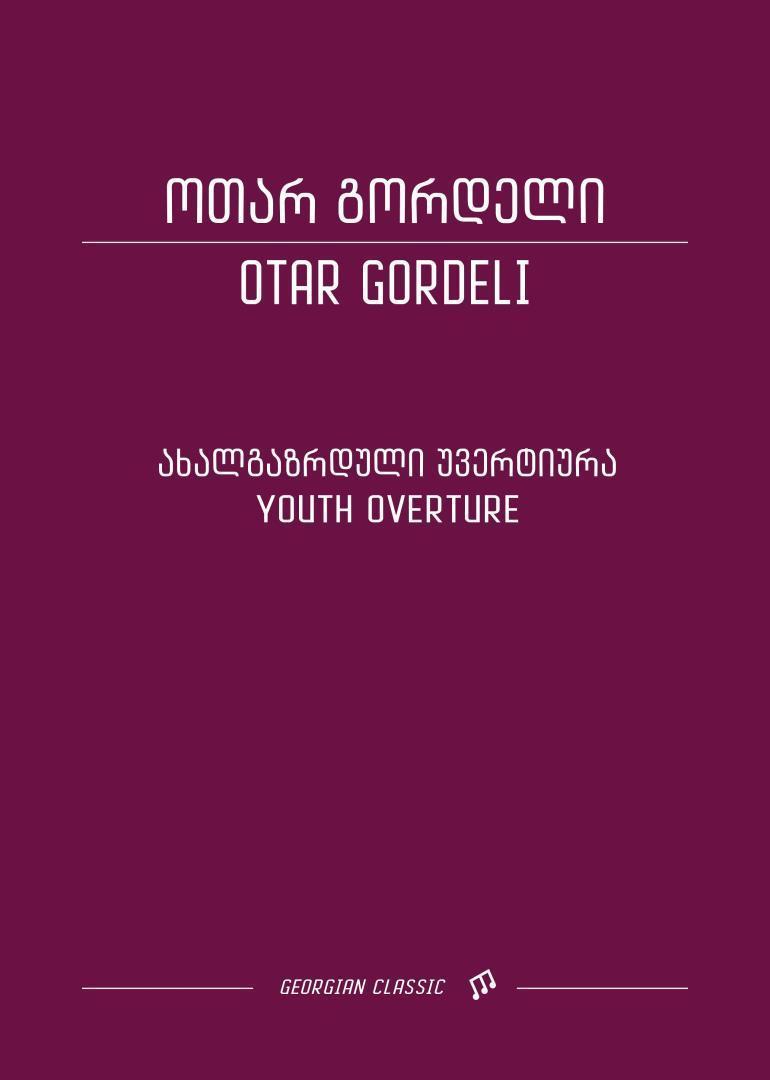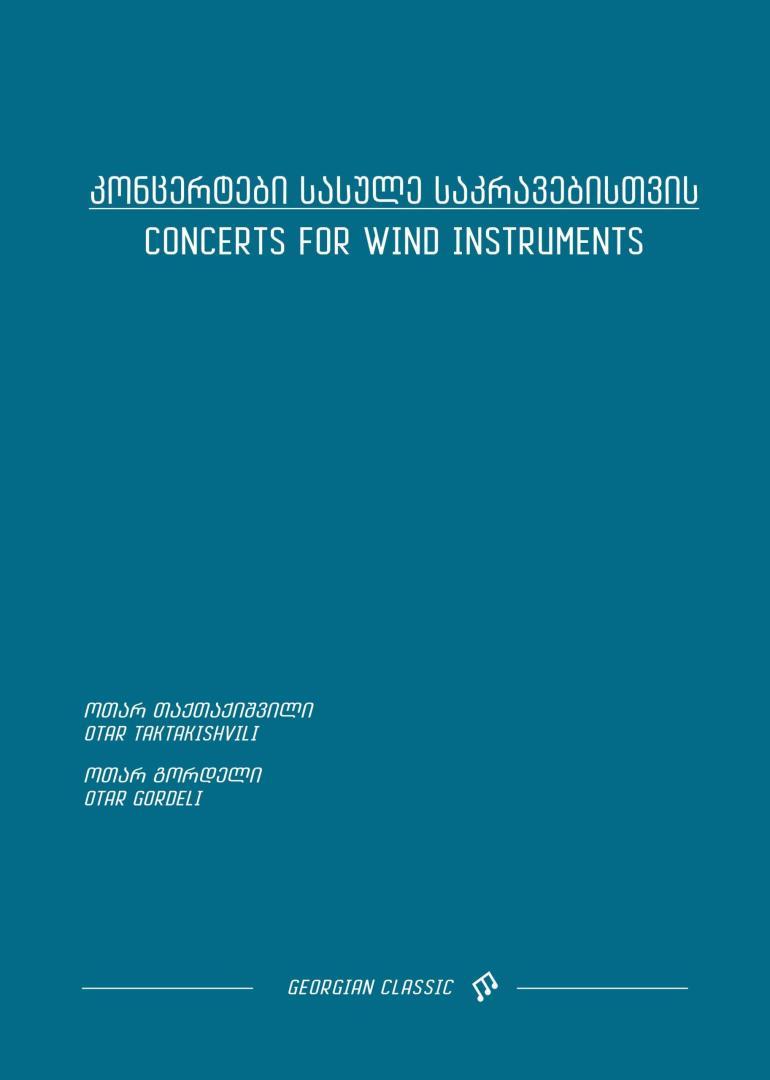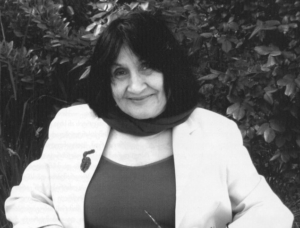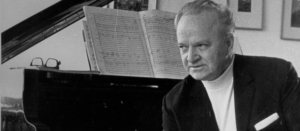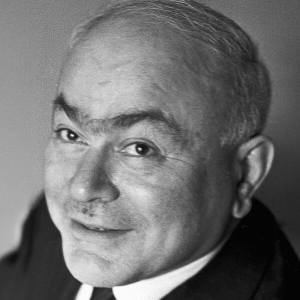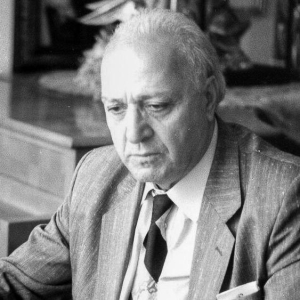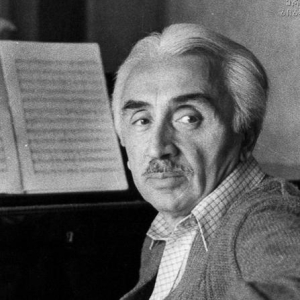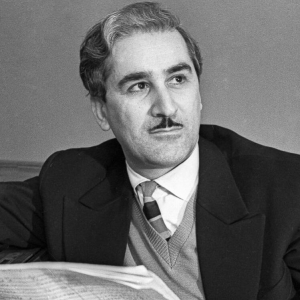Otar
Gordeli
Otar Gordeli
(1928 – 1994)
Otar Gordeli, Georgian Composer, Pianist. One of the founders of jazz in Georgia. Honored Worker of Georgian Art (1966)
Date of birth – November 18, 1928
Place of birth – Tbilisi, Georgia
Date of death – December 6, 1994
Place of death – Tbilisi, Georgia
He is buried in Didube Pantheon of Writers and Public Figures – Tbilisi
BIOGRAPHICAL DATA
1938 – 1946 – Studied at Z. in Paliashvili Tbilisi Musical Gymnasium (Decade of Talents) – majoring in composition (Andria Balanchivadze’s class) and piano (Evgenia Cherniavskaya’s class);
1951 – Graduated from Tbilisi State Conservatory named after Vano Sarajishvili, majoring in composition (Iona Tuskia’s class) and piano (Anastasia Virsaladze’s class);
1955 – Graduated from Moscow State Conservatory with a specialization in composition (supervisor – Semyon Bogatirov);
Since 1959 – Teacher of Vano Sarajishvili Tbilisi State Conservatory;
Since 1972 – Docent of Vano Sarajishvili Tbilisi State Conservatory;
Since 1982 – Professor of Vano Sarajishvili Tbilisi State Conservatory;
AWARDS AND RECOGNITION
1966 – Honored Art Worker of Georgia
1968 – 1973 – Member of the Board of Directors of the Union of Composers of Georgia and Secretary of the Board (1968–1973)
1967 – 1990 – Chairman of the Georgian Music and Choreography Society
Director of Zakaria Paliashvili House–Museum
Otar Gordeli
(1928 – 1994)
SELECTED WORKS
MUSIC FOR THE THEATER
1980 – “Natvris Tvali” (“Eye of Garbage”) – Musical Comedy in 3 Acts – (libretto – V. Yakashvili)
1983 – “My Beloved Uncle” – Musical Comedy in 3 Acts – (libretto – L. Chubabria, N. Areshidze)
ORCHESTRAL MUSIC
1964 – Symphony
1953 – “Motherland” – Symphonic Poem
1956 – “Youth Overture”
1957 – “Festive Overture”
1958 – “Georgian” – Symphonic Dance
1964 – “Pasakalia” – for Symphony Orchestra
1965 – Suite for Symphony Orchestra N 1
1968 – Suite for Symphony Orchestra N 2
1965 – Allegro for Symphony Orchestra
1950 – Concerto for Piano and Symphony Orchestra N 1
1958 – Concertino for Flute and Symphony Orchestra
1959 – Concertino for Bassoon and Chamber Orchestra
VOCAL AND VOCAL-INSTRUMENTAL MUSIC
1948 – “Kolkheti” – Cantata – (text – I. Noneshvili)
1954 – “To the Defenders of the Caucasus” – Cantata for Readers, Children’s Choir and Symphonic Orchestra – (text – I. Grishshvili)
1961 – “What does the pain tell us” – Vocal-Symphonic Poem for Choir and Symphonic Orchestra – (text – P. Gruzinski)
1958 – “Ode to Georgia” – for Soloist, Mixed Choir and Symphony Orchestra – (text – M. Fotshishvili)
1966 – “Prayer of Avtandil” – Choral Poem for Mixed Choir – a Cappella – (text – Sh. Rustaveli)
1982 – “Madrigal” – Choral Poem for Children’s Choir – a Cappella – (text – I. Noneshvili)
CHAMBER-INSTRUMENTAL MUSIC
1949 – Piano Quintet
1960 – Sonatina – for Piano
1972 – Suite for Piano
1975 – Passacalia and Fugue for Piano
1960 – Polyphonic Overture for Two Pianos
1960 – Andante/Allegro – for Piano
AUTHOR OF MANY CHORAL WORKS, SONGS, INSTRUMENTAL PIECES…
FILM AND THEATER MUSIC
AUTHOR OF MUSIC FOR MORE THAN 40 PLAYS. BETWEEN THEM:
“Hurricane”, “Hotel Housekeeper”, “Divine Comedy”, “Filumena Marturano”,
FILMPGRAPHY
1959 – “Last Summer” – director – Geno Tsulaia, Nelli Nenova
1974 – “Cerodena Knights” – director – Geno Tsulaia, Nelli Nenova
1965 – “Time runs out at dawn” – director – Geno Tsulaia, Nelli Nenova
1975 – “Time runs out at dawn” – director – Baadur Tsuladze
1965 – “Mother’s hand” – director – Merab Jaliashvili
1967 – “Kochora” – director – Giuli Chokhonelidze
DOCUMENTARY
1957 – “Lado Gudiashvili” – director – Geno Tsulaia, Nelli Nenova
1957 – “Conquest of the Seven Peaks” – director – Boris Kreps
1958 – “Gelati” – director – Lana Gogoberidze
1959 – “Drone of the Year in Georgia” – director – Irakli Kandelaki
1963 – “Dioscuria” – director – Irakli Kandelaki
Otar Gordeli
(1928 – 1994)
Otar Gordeli attracted attention of Georgian society at an early age as a composer, performer – pianist, and person of exceptional talents. When he studied at the postgraduate school under the supervision of composer Bogatirov. At the same time he drew attention of Moscow musical society. His family atmosphere was mainly formed by Otar Gordel’s mother, singer and Tbilisi Conservatory teacher, Nadezhda Abashidze-Buzogli, and was appealing to Tbilisi musicians. The operas “Daisy” and “Latavra” were dedicated to Gordeli’s mother by the famous composer Zakaria Paliashvili.
Otar Gordeli’s music burst out like a spring in Georgian professional musical art,” composer Felix Ghlonti commented. This was due to the uniqueness, individual style, and exceptional generosity. In fact, with Otar Gordeli’s works, a new and significant era in Georgian music was opened. Composer intonations, as well as other aspects of musical expressions like as harmony and texture, were colourful. That is why his compositions have received world wide recognition in both Tbilisi and Moscow.
Considering Otar Gordeli, there was a sense in the society and he was considered as a composer, to whom the future of Georgian professional music would be connected… and the composer continued to work. However, his early works remained the peak of his creativity, and they have not lost their artistic value even now. This refers to the piano quintet (1949) and the piano concerto (1950). It was first performed by Alexander Iocheles, conducted by Alexander Gauk, and achieved big success. His flute concerto (1958) was first performed by Alexander Korneev, conductor Yevgeny Svetlanov, and gained great success. This was the first time, Georgian partitura was performed outside of the USSR.
And that is why, composer Sulkhan Nasidze, pointed out – “Otar Gordeli was a musician who brought glory to Georgian music.” “Mark Custon record” and “Monitor” studios in the United States recorded the concert. Now, practically every institution of higher education in the USA include this work in their program.
It is played in almost every competition. This concert has been in the Chicago Orchestra’s repertoire for 30 years. Especially popular at the time were Otar Gordel’s symphonic dances “Waltz” and “Georgian” (1958), “Akhalgazduli Overture” for symphony orchestra (1956), and vocal-symphonic poem “Razed Butbutobs Mtkvari” (1961). Musicologist Anton Tsulukidze noted
– “In Georgian professional music, Otar Gordeli’s “Razed Butbutobs Mtkvari” was an essential achievement of this genre, written with true professional skill and feeling.
The fugue based on a folk marcher’s accent is particularly impressive.” Otar Gordel’s works are distinguished by a delicate approach to folk themes; this delicacy represents his composing ideas, and the composer’s personal aristocracy is also etched on his style.
Otar Gordeli’s operettas were successfully staged in the Tbilisi Musical Comedy Theater in 1980s: “Natvristvali” (1980), “My Beloved Uncle” (1983).
Otar Gordeli composed music for movies and documentaries. “Otar Gordeli’s name is engraved in the chronicles of Georgian music,” says musicologist Gulbat Toradze.
Musicologist
Tamar Tsulukidze
English Language Translator
Tamar Kharadze








